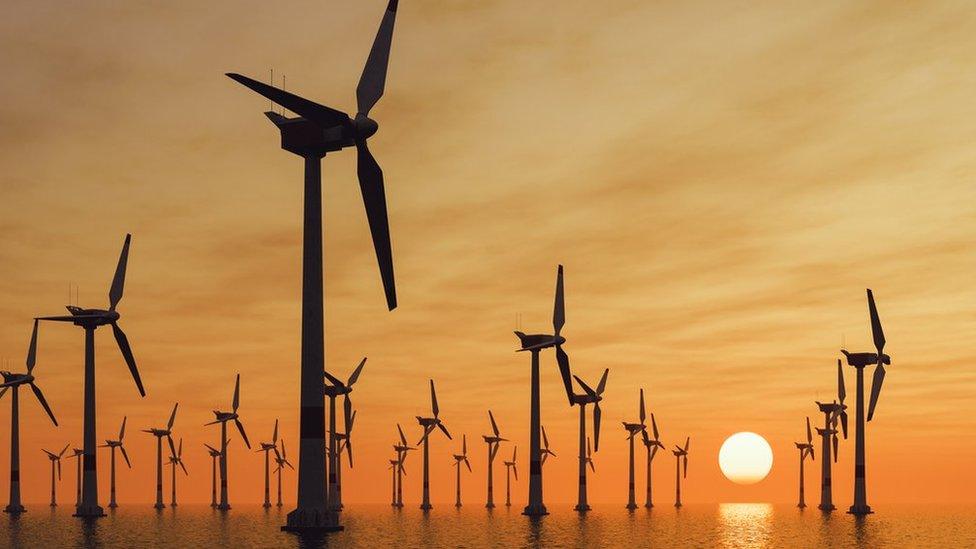Lydia West show adopts 'pioneering' new model for UK tour
- Published

It's A Sin star Lydia West will star in the London production, which is being staged at the Barbican
A new theatre production will leave its cast, crew and creative team behind when it leaves London to tour the UK.
It's A Sin star Lydia West will appear in the one-woman play about climate change at London's Barbican this week.
The show is powered by 10 cyclists on stage, who pedal constantly to generate the energy to cover the performance.
But when its London residency ends, West and the team will not take the show to its other stops. Instead, local crews will reassemble it in each area.
A new regional star, director, choir and creative team will stage the same play when it opens in Coventry, Newcastle-under-Lyme, Plymouth, York and Merseyside.
The concept has been devised in an effort to discover ways to reduce the theatre industry's impact on the environment and prevent the need for travel.
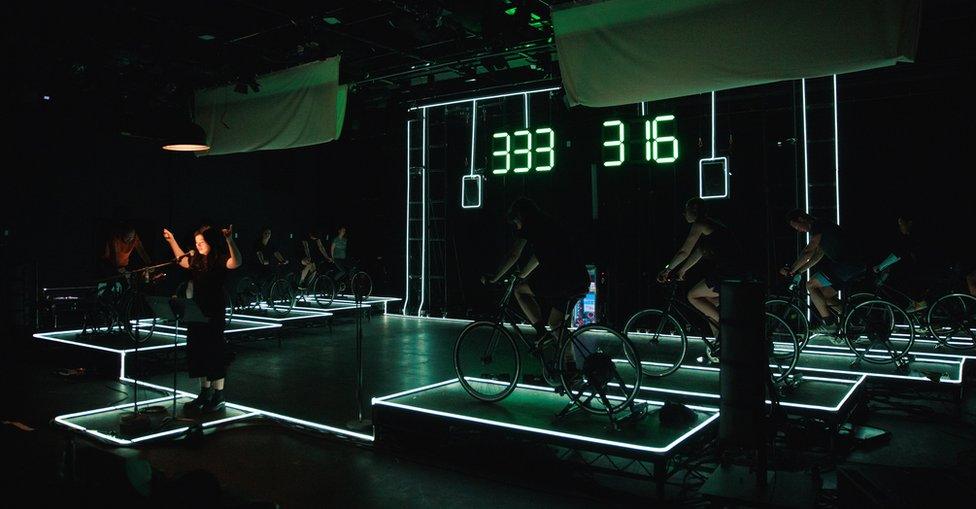
Ten cyclists power the energy to cover the performance, with the watts being generated displayed live on a large screen
A Play for the Living in a Time of Extinction, written by Miranda Rose Hall, has already been successfully staged across Europe, with the concept now transferring to the UK.
Director Katie Mitchell, who has worked on productions about climate change since 2012, first launched the show in Switzerland two years ago, before it went on to play other venues around the continent.
"I suggested we did zero movement of materials and people between venues, and we would do an international tour, based on that principle," Mitchell tells BBC News.
Hall's play was then chosen for the venture, and the concept has now been picked up by UK touring company Headlong for a series of performances around England.
"It's a delicate experiment in what happens when we really try and tune in to local audiences rather than just deliver the same product around the country, which is what we normally do," says Holly Race Roughan, artistic director of Headlong.
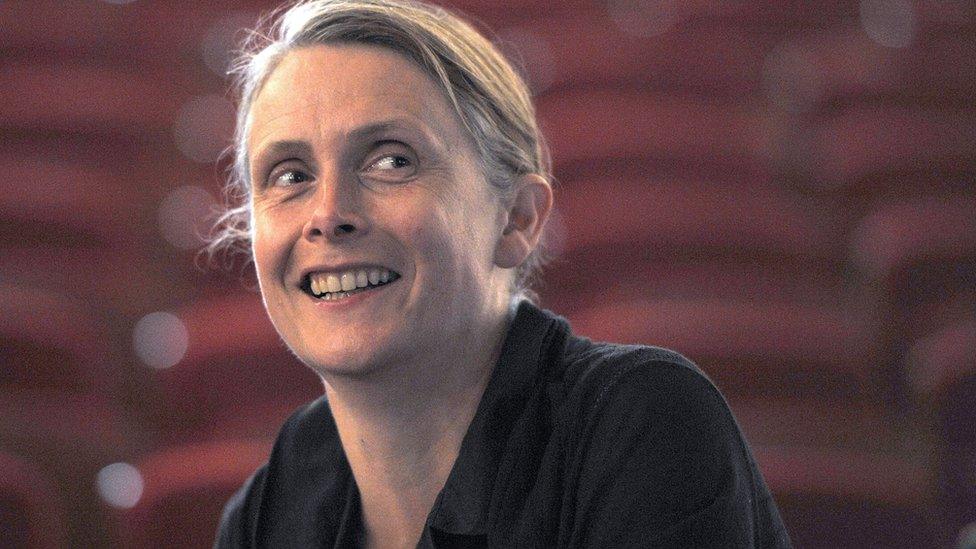
Katie Mitchell, director of the UK tour's London production, first launched the show in Switzerland two years ago
There is likely to be variation between the way each local group of creatives interpret and stage Hall's play - something the team see as one of the concept's main selling points.
"I don't know anything about what's going on in Coventry or Stoke-on-Trent, I'm not based there locally, I don't know the audience," notes Mitchell.
"So it's lovely that young directors in those cities, with a few parameters, magic up something completely different."
Roughan adds: "There is going to be a relationship between all the shows. Not quite twins, more like siblings.
"So if you rock up in Plymouth, you will see a show which aesthetically feels like the Barbican show or the Coventry show, but each team of local artists will be adding their twist, their take, meeting their audiences."
Each venue is issued with a set of guidelines, one of which states that the performance should be "off-grid", with the electricity generated by cyclists pedalling stationary bikes during the performance.
Coldplay's most recent tour had an "eco-friendly" focus
Across the arts industry, an increasing number of performers and producers are trying to incorporate sustainability into their tours, as part of a larger push to be more environmentally friendly.
Coldplay added kinetic dance floors, external and energy-storing stationary bikes to their recent Music of the Spheres tour, encouraging fans to help power the show by dancing or pedalling.
"So when a frontman says 'we need you to jump up and down', when I say it, we literally really need you to jump up and down, because if you don't then the lights go out," singer Chris Martin told BBC News in 2021.
The group also planted a tree for every concert ticket sold, ensured their wristbands were made from compostable and plant-based plastic, encouraged fans to bring reusable bottles for the free water stations, and powered the concert from renewable energy.
The arts industry as a whole generated more than 60,338 tonnes of CO2 emissions from 2021 to 2022, according to Arts Council England's most recent annual report, external on culture, climate and environmental responsibility. Theatre accounted for 17% of that carbon footprint.
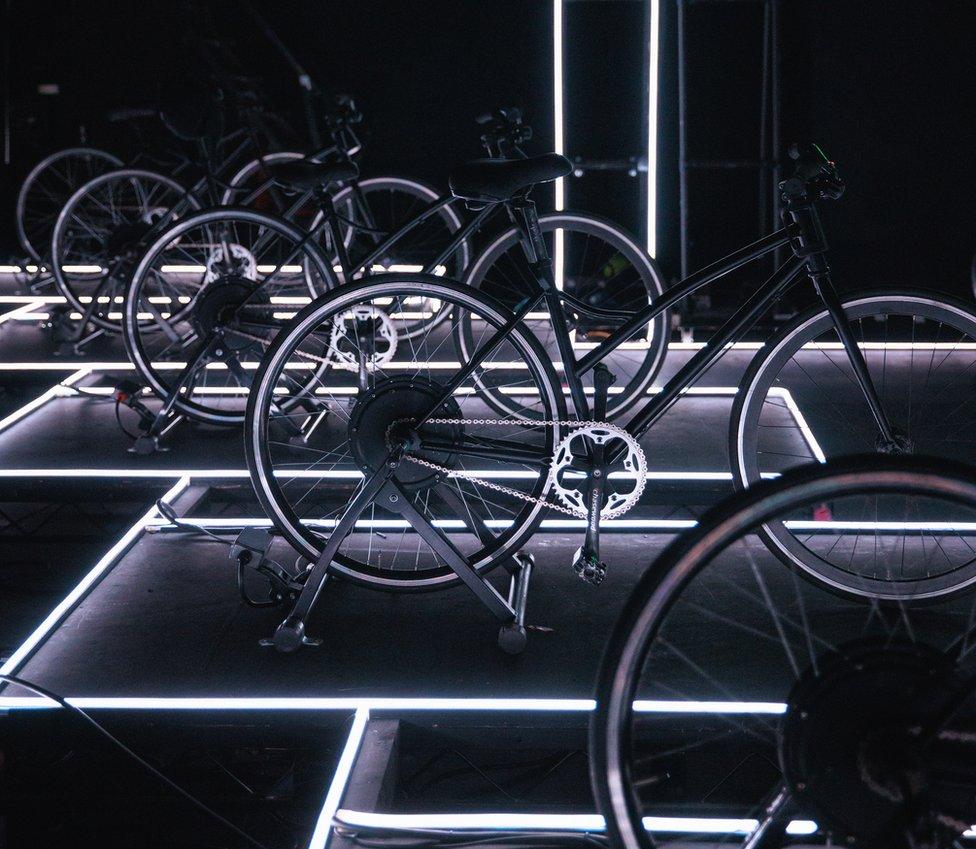
The bicycle technology will travel between venues, but new local volunteers will pedal during each regional performance
In addition to the sustainable concept surrounding A Play for the Living in a Time of Extinction, the show itself also deals with environmental themes.
The plot follows a young theatre worker who wants to stage a play about climate change as she reckons with man-made damage to the environment. It is a somewhat meta premise - essentially a play within a play.
"As a company, we're committed every year to putting on a play that either directly tackles the climate crisis, or innovates and experiments with touring in a greener way. Sometimes it can do both, which is what this project is about," says Headlong's Roughan.
When the play was staged in Canada, theatre critic Savannah Stewart said:, external "For a show about mass death, it expertly avoids plunging its audience into insurmountable existential dread. The message it leaves the viewer with is one of hope, not despair."
While no materials travelled with the show around Europe, the bicycle technology will travel between the British venues because of limited resources in some local areas.

West (second left) previously starred in Channel 4's acclaimed drama It's A Sin, about the Aids crisis in the 1980s
Watching the rehearsals taking place deep underground in the Barbican, it's striking just how much energy is required to provide the small amount of lighting and amplification required for the one-woman show.
The 10 cyclists have to pedal constantly, maintaining a certain wattage, which is displayed live on a pair of screens. And yet, the show has production values and energy consumption much lower than average.
"It's 120,000 watts for a normal Barbican show," Mitchell explains. "We're going to go down to between 500 and 600 watts."
That means the cycling model is unlikely to be adopted for high-production musicals in the West End any time soon. But the team hope to encourage debate in the theatre industry about how to incorporate green policies into productions.
"You couldn't roll this model out easily," Mitchell admits. "But it's a pioneering model, so what it's trying to do is have a conversation about touring.
"When we come to tour any show, be it a large musical or a one-woman show, can we start asking more challenging questions about the movement of people and materials between the venues?"
West says sustainability is the direction of travel for the theatre industry. "It's the way we need to tour in the not-so-distant future and it proves that art can be ecological and sustainable," she says.
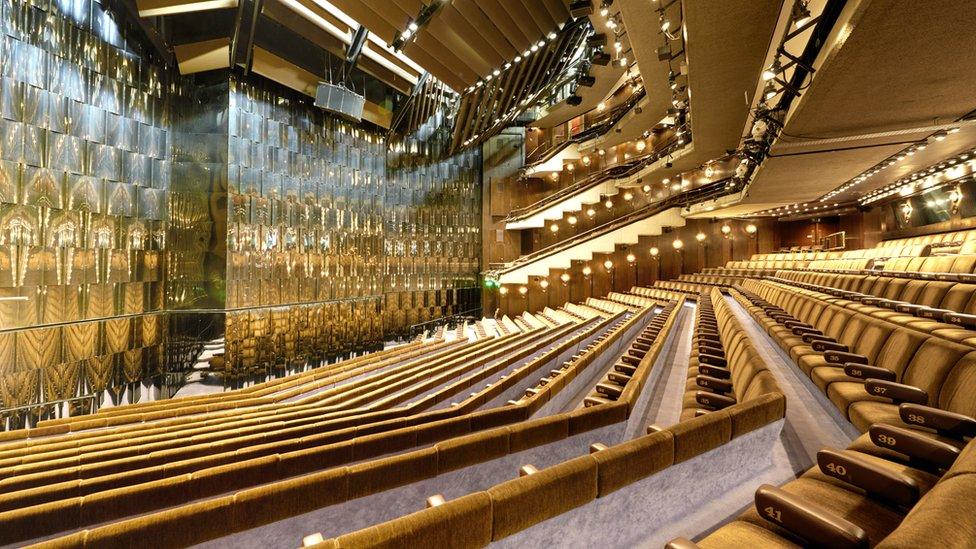
An average show at the Barbican needs 120,000 watts, but Hall's play needs only around 600
Although the public are well aware of climate change and may have made lifestyle changes as a result, getting them to come and see a worthy-sounding play about it in their leisure time could be a potential obstacle.
But Roughan says she sees the show as a slightly different proposition. "I think it's an invitation to come and be part of imagining an alternative way of doing something," she says.
"By no stretch of the imagination are we saying 'OK, we've solved it, from now on in, all theatre is going to be made this way'. I think we're trying to just crack open this idea that theatre has to be made in the same way we've always made it, by using this project to catalyse."
West adds: "I hope people leave feeling connected, spoken to, seen and heard and it brings the audience closer to myself and one another - and they take a fraction of that into their daily life with everything they interact with. Because we are never outside of nature."
A Play for the Living in a Time of Extinction opens at London's Barbican on Wednesday, before touring in Coventry, Newcastle-under-Lyme, Plymouth, York and Prescot (Merseyside).
- Published21 November 2019

- Published3 May 2024
